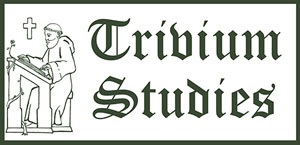
Trivium-Philosophy-Theology Primer: As a preparation for the study of formal logic, this class introduces the basic vocabulary of logic and the basic skills involved in recognizing and understanding logical terms, and statements. In addition, first steps are taken in the practices of using terms clearly, formulating judgments truthfully, and even constructing simple arguments validly. The knowledge and skills gained will make the transition into Trivium Studies 1: Traditional Logic easy and smooth.

Trivium-Philosophy-Theology 1: Formal Logic This class emphasizes the structure of logical reasoning, the form that right reasoning takes. It begins with an Aristotelian account of the three acts of the intellect: simple apprehension, judgment, and reasoning. These acts are verbalized as terms, propositions, and syllogisms, respectively. With this background, the students learn the four types of logical proposition, the square of opposition for understanding the ways in which those propositions are related, and the rules for combining propositions into syllogisms without error. The course concludes with the consideration of various complex forms of the syllogism and numerous case studies of famous arguments. The second half of the year emphasizes the practice of "translating" and analyzing "ordinary language arguments."

Trivium-Philosophy-Theology 2: Advanced Logic & Rhetoric The student who has been learning advanced grammar and syntax in the Latin cycle, and who has taken Logic will find a completion to our introduction to the mediaeval trivium in this class. First, we cover material logic; that is, we look at how to think about the content, rather than the form of logical reasoning. Then, drawing upon Aristotle's Rhetoric and other Greek and Roman works, we continue the exploration of what language and thought are, now focusing upon thought as expressed to others with the goal in mind of bringing other minds to truth.
Rhetoric the "modes of persuasion," beginning with logos already studies in logic class and then moving on to how we are motivated by what is attractive to our emotions (pathos) and noble to our wills (ethos). This necessitates an introduction to the philosophy of human nature in order to understand the faculties of reason, will, appetite, and sensation. In addition, the course offers a defense of rhetoric reliant upon beauty and lays out a practical imitative approach to composition, using the five canons.